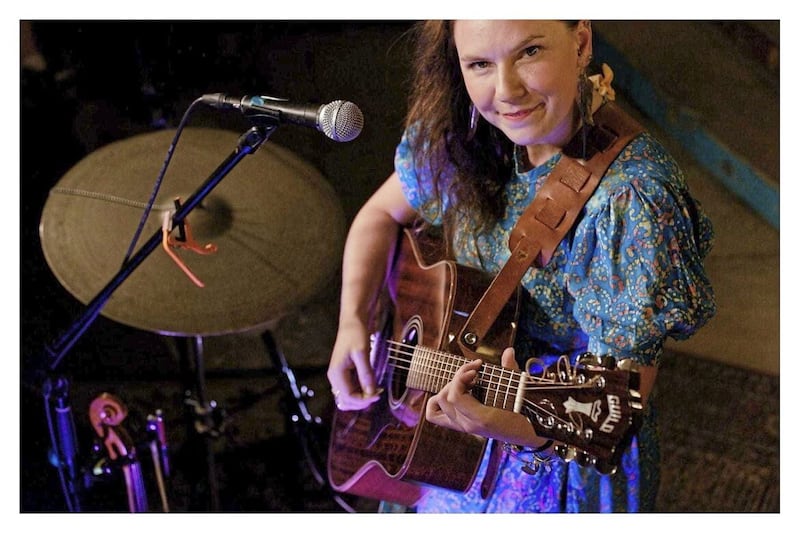WHEN it comes to music, there is nothing I like more than one of those “it sounds crazy but it-might-just-work” scenarios and there is certainly one coming up at the Kilkenny Arts Festival next week, thanks to Armagh-born concertina player Niall Vallely.
Billed as a “musical celebration of the struggle for civil rights in Ireland and America”, Sounds Like Freedom will feature The Harriet Tubman Trio, along with Niall Vallely himself, singer Karan Casey, Scottish fiddler and composer Aidan O’Rourke and Belfast harp and electronica genius Úna Monaghan.
Named after a celebrated African American who liberated 300 slaves, the The Harriet Tubman Trio is a powerhouse of New York’s experimental jazz scene whose earth-scorching blend of funk, rock, jazz – not the kind of band you would imagine where you wouldn’t find much affinity with the Irish concertina.
So what brought these strange bedfellows together, I asked Niall.
“Well, I’ve been interested in jazz as well as traditional music for a long time and I was doing a tour with a jazz singer called Cassandra Wilson about two years go with Brandon Ross from the Harriet Tubman Trio who was the guitarist and ever since then I’ve always wanted to do something with him.
“The trio come from an avant garden jazz scene but they are also fairly politically charged in that they’re involved in the Black Lives Matter movement and other campaigns so with the anniversary of the civil rights movement in the north, the idea for the show came into my head,” he explains.
It is well documented that the struggle for civil rights in the north of Ireland was highly influenced by what was happening in America with people here inspired by Martin Luther King and the tactic of non-violent opposition to end widespread injustice.
When Bernadette Devlin visited America in 1969, it was reported that she “identifed closely with the struggle of African Americans, much to the dismay of Irish Americans”.
However, Irish support for African Americans goes back further than that, of course, with the escaped slave and ardent abolitionist Frederick Douglass giving a talk in Belfast in 1845.
“Instead of the bright, blue sky of America, I am covered with the soft, grey fog of the Emerald Isle. I breathe, and lo! the chattel becomes a man,” he told a packed and supportive audience in December of 1845, with the Famine beginning to ravage Ireland.
That international aspect of different civil rights struggles always interested Niall.
“For me, I always tried to bring it home to people that what was happening in the north in the 1960s wasn’t just a parochial squabble but it was related to what was happening in other parts of the world,” he explains.
As far as the music is concerned, of course, there was the upsurge of protest songs which started in the USA where opposition to the Vietnam War was channeled through song. Niall admits it’s a little more difficult to take an overt political stance when you play traditional dance music.
“You end up getting involved in benefit concerts which tends to be the main political activity for instrumental musicians,” he says.
But when it comes down to it, it is the music that forged the links in the first place.
“Brandon was involved with Cassandra Ross for many years and he brought a particular sound to his guitar playing which I really liked and you would hear certain things emerging from the songs we did each night that make me think of a way of building something around that.”
Of course, Niall’s wife, Karan Casey, is also very much into jazz and motivated by political songs, both Irish and American, and so the pair saw the collaboration with the Harriet Tubman as something very much worth trying.
“When you start looking into the material, it’s interesting, the interconnections, because in America you have the folk revival happening at the same time as the Civil Rights movement and you have the likes of Woody Guthrie and Pete Seeger who were influenced by Irish music and in turn influenced Irish music itself.
“At the same time, they also had connected with people in the jazz world like Nina Simone and Odetta and those people who sort of bridged the folk and jazz worlds at that period in time,” explains Niall.
But what about the show itself? What can the audience expect?
“Well, with Úna Monaghan and Aidan O’Rourke, I wanted to bring in people who were adventurous because it is in the nature of jazz and in what the Harriet Tubman Trio do – a lot of it is about improvisation and experiencing the moment and creating a feel. With trad, you can only do that in a limited way so this is quite a challenge for me,” says Niall.
Indeed. It sounds crazy but it might just work!
Kilkenny Arts Festival is celebrated for its effortless blend of tradition and innovation, and for its electrifying range of events, staged in some of the country’s loveliest venues so I for one am really looking forward to it.
The 2019 festival runs until August 18.
If the above is a little too avant garde for you, then Niall also has another new work exploring the history and myths associated with Emain Macha, the Navan complex.
The evening includes a dramatic performance by the Armagh Rhymers, musicians from Armagh Pipers Club and audiovisual displays together with a promenade to the fort itself.
You are advised to come dressed for the weather as part of the performance is outdoors.
The show is on September 6.








